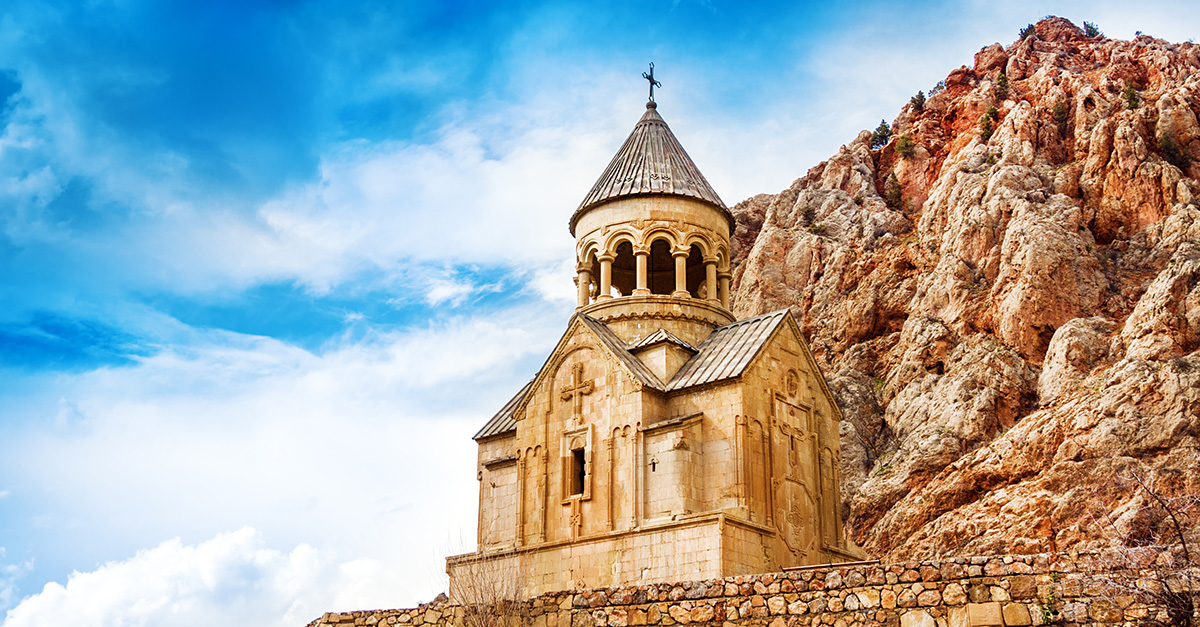


Get a free copy of Parental Rights & Education when you subscribe to our newsletter!

The world’s oldest Christian community is once again remaining steadfast and faithful in the face of adversity and religious hostility. Here’s what American Christians need to know — and how they can help.
In the shadow of Mount Ararat, where Noah’s ark came to rest after the great flood, lies the ancient land of Armenia — a place deeply intertwined with Christian history. From the early days of Christianity, Armenians have proudly embraced their faith, enduring centuries of persecution yet standing resolutely as one of the world’s oldest Christian communities.
In fact, at the beginning of the fourth century A.D., Armenia became one of the first nations in the world to make Christianity its official religion. But in recent decades, Armenian Christians have suffered terrible persecution for their faith. That persecution has continued into the present day.
The Catholic News Agency (CNA) reported on September 25: “Thousands of Armenian Christians have fled their ancestral homeland in the region of Nagorno-Karabakh over the weekend and more are expected.”
These Christians are fleeing the region because the Muslim nation of Azerbaijan has conquered the area, after having it trapped behind a blockade for months, and there are credible concerns that Azerbaijan is preparing to carry out a genocide against Christian Armenians. The former chief prosecutor of the International Criminal Court has “called for the U.N. Security Council to bring the matter before the international tribunal,” according to CNA.
This article delves into the historical context of Christian persecution in Armenia, examines the present-day crisis, assesses the United States’ role in addressing the issue within the broader foreign policy climate, and finally, reflects on how Christians should respond, guided by the teachings of the Bible.
Christianity in Armenia dates back to the third century A.D. and is a story etched with faith, resilience, and sacrifice. Despite periods of relative tolerance under some Persian rulers, Armenian Christians faced waves of persecution from neighboring empires, particularly the Roman Empire and, later, the Persian Sassanid dynasty.
1. The Roman Period: During the Roman era, Armenia witnessed intermittent persecution of Christians. The year 301 A.D. marked a watershed moment when Armenia became the first nation to officially adopt Christianity as its state religion, under King Tiridates III. However, this move did not instantly erase persecution; Christians were still subject to brutality, torture, and martyrdom.
2. The Sassanian Empire: In the fourth and fifth centuries, the Persian Sassanid Empire controlled Armenia and unleashed even harsher persecution against Christians. This period saw countless Christians martyred for their faith as they refused to renounce Christ.
3. The Armenian Genocide: The Armenian Genocide, which took place during World War I, was the systematic killing and deportation of Armenians by the Turks of the Ottoman Empire. The genocide unofficially began with the arrest of 250 Armenian intellectuals by Turkish officials on April 24, 1915, at which point the leaders of the Turkish government set in motion a plan to expel and massacre Armenians. This was followed by a series of systematic deportations, mass executions, and intentional starvation. By the early 1920s, when the genocide finally ended, between 600,000 and 1.5 million Armenians were dead, with many more forcibly removed from the country.
Despite these tribulations, Armenian Christians held steadfast to their beliefs. The faith they demonstrated in the face of adversity serves as a testament to the power of Christianity to endure and flourish even amidst persecution.
Fast-forward to the present day, and Armenia continues to grapple with Christian persecution. The fall of the Soviet Union in 1991 brought newfound religious freedom to the region. However, Armenia now faces a modern-day crisis in the form of political instability, territorial disputes, and increasing religious tensions.
The current situation in Armenia, particularly in the disputed region of Nagorno-Karabakh, also referred to as the Republic of Artsakh, is quite concerning. As previously mentioned, the military of Azerbaijan has maintained a blockade of the region since December 12, 2022, which has created a humanitarian crisis. The blockade has denied basic needs to those living in the region, including food, energy, access to medical care, school, and Internet services.
AP explained the history of the dispute:
“Nagorno-Karabakh is a region within Azerbaijan that came under the control of ethnic Armenian forces backed by the Armenian military in separatist fighting that ended in 1994. Armenian forces also took control of substantial territory around the region.
Azerbaijan regained control of the surrounding territory in a six-week war with Armenia in 2020. A Russia-brokered armistice that ended the war left the region’s capital, Stepanakert, connected to Armenia only by a road known as the Lachin Corridor, along which Russian peacekeeping forces were supposed to ensure free movement.”
First Things noted the Christian significance of the area and what the Armenians are facing:
“The tiny mountain region (Nagorno-Karabakh) was once home to 120,000 Armenian Christians governing themselves in a de facto independent republic, the Republic of Artsakh. Armenians have been living in this region for thousands of years, and they have been Christians since the fourth century. The dozens of ancient and medieval churches dotting the landscape bear witness to this history.
But for nine months, the dictatorship of Azerbaijan had been blockading this region. The siege led to a hunger crisis and created dire fuel and medicine shortages. One horrifying indicator of the scale of the suffering: the miscarriage rate in the territory reportedly quadrupled.”
The Armenian Christians living in this region are suffering most under these conditions. The blockade has resulted in near-starvation conditions and has led to a mass exodus of Armenian Christians from their ancestral homeland. More than 100,000 people have reportedly fled the region.
Now that Azerbaijan has essentially won control of the region, the Armenian Christians fear a renewed round of increased persecution. CNA, again, reports that:
“Following the breakaway region’s defeat by Azerbaijan, Azeri President Ilham Aliyev said that Armenians in Nagorno-Karabakh would be integrated and that representatives from the enclave were ‘invited to dialogue’ with the Azeri government.
Despite these promises, widespread fears of religious and cultural persecution have led large swathes of the population to flee to Armenia proper.”
The United States must play a crucial role in addressing Christian persecution in Armenia, driven by its commitment to religious freedom and human rights on the global stage. In the broader foreign policy climate, several factors shape the U.S.’s approach to this issue.
On the international diplomacy front, the U.S. continues to engage in diplomatic efforts to promote peace and stability in the South Caucasus region, emphasizing the importance of religious freedom and human rights in its negotiations with Armenia and its neighbors.
The U.S. has also provided humanitarian and development assistance to Armenia, including programs aimed at promoting religious tolerance and protecting the rights of Christians in the region. However, more can still be done.
However, as Joel Vledkamp noted at First Things, too often the U.S. government is not willing to speak as boldly about the issue of life-threatening persecution occurring because of other groups’ hatred for Christians and tries to frame things in the vaguer category of “religious freedom.” Vledkamp explained,
“This category shift has been so debilitating that, as the bombs were falling on Armenian Christians in September 2023, Christianity Today saw fit to publish just one piece about the attack—an article that interviews six “religious freedom experts” about whether or not specifically Christian advocacy for the Armenians would be appropriate.
An urgent task is now before Christian leaders and activists: to free our imaginations from the constraints of “international religious freedom” and its definitions, and to rediscover our biblical calling to solidarity with the body of Christ (I Cor. 12:25–26).”
But as Robert Nicholson, president and founder of the Philos Project, argued, “Christians often make the mistake in thinking that the Christian thing to do is not specifically advocate for Christians. But love for the brethren is the preeminent marker of New Testament faith, so I double down in my support.”
As Christians, guided by the Bible, our response to Christian persecution in Armenia must be rooted in love, compassion, and a commitment to defending the rights of those facing oppression. Here are three ways Christians in America can support our fellow believers facing persecution in Armenia:
1. Prayer — The Bible teaches us to pray for those who are persecuted. Romans 12:12 says, “Rejoice in hope, be patient in tribulation, be constant in prayer.” We should fervently pray for our fellow believers in Armenia and for peace in the region.
2. Advocacy — Proverbs 31:8-9 instructs us, “Speak up for those who cannot speak for themselves, for the rights of all who are destitute. Speak up and judge fairly; defend the rights of the poor and needy.” Christians should advocate for the rights of persecuted believers in Armenia through awareness campaigns and support for organizations championing their cause. And Christians should be unapologetic in their support for Armenia Christians as Christians, pointing out that what is happening is not just a violation of a general notion of “religious freedom” but rather a specific attack on Christians by Muslims.
3. Humanitarian Aid — We can follow the example of the Good Samaritan (Luke 10:25-37) by providing practical help to those suffering in Armenia. Donations to relief organizations and efforts to alleviate the suffering of persecuted Christians can make a significant impact.
The history of Christian persecution in Armenia reflects the enduring faith of a people who have faced adversity with unwavering devotion to Christ. In the present day, Armenia grapples with a complex set of challenges, including territorial disputes and religious tensions. The United States, driven by its commitment to religious freedom, plays a crucial role in addressing these issues on the global stage.
As Christians, our response must be guided by the teachings of the Bible, emphasizing prayer, advocacy, and humanitarian aid, to support our persecuted brethren in Armenia. In doing so, we continue the legacy of those who have gone before us, standing firm in faith and obedience to Jesus Christ — even, and especially, in the face of adversity and persecution.
The Church must be involved in public discourse and influence. That’s why we write — so our readers can be equipped to understand and pursue righteous change in the world. For more timely, informative, and faith-based content, subscribe to the Standing for Freedom Center newsletter.
Christian conservative news and issues that matter. Curated just for you!
